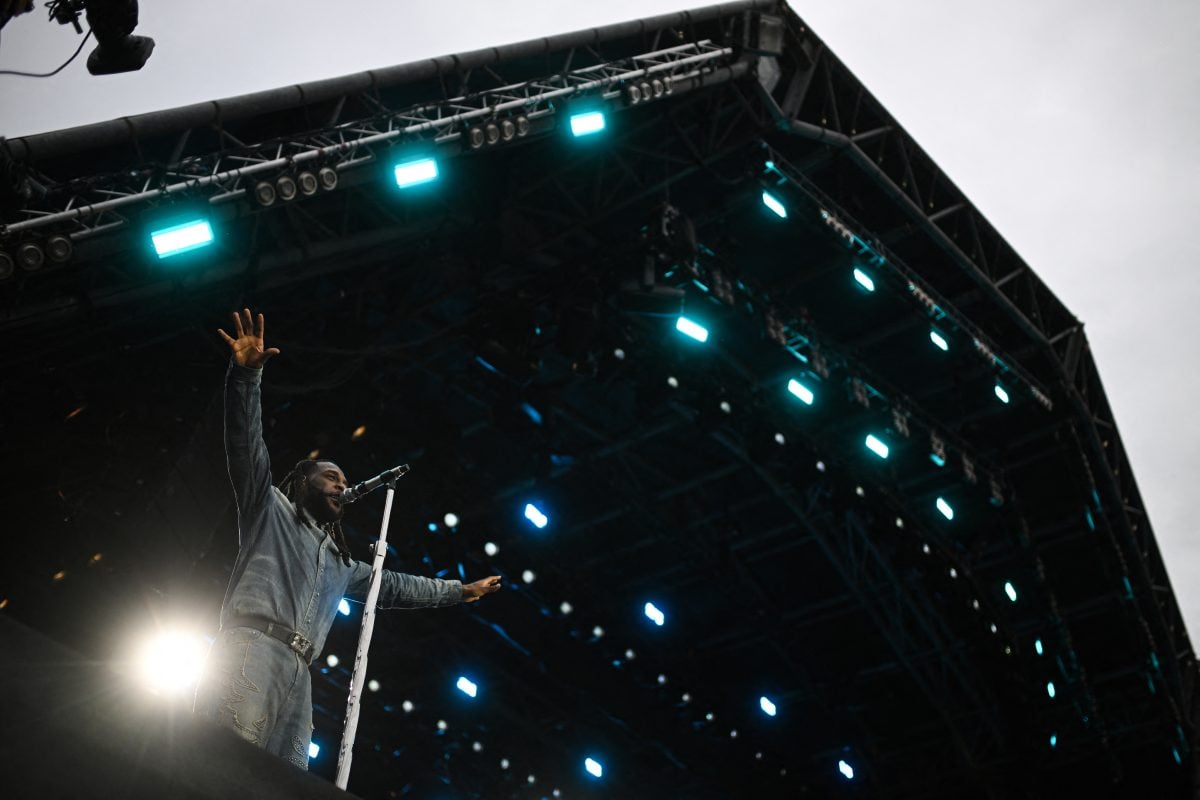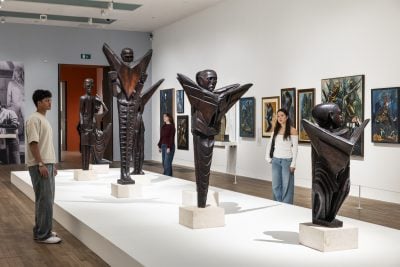On a stage in front of thousands of screaming, mud-covered fans, Nigerian singer Tems is performing at Glastonbury music festival to roaring success. On another stage a few fields over, fellow Afrobeats star Ayra Starr performed the day before to crowds of fans. On Glastonbury’s final day, Afrobeats megastar Burna Boy (pictured) took his stage by storm.
“We’ve been waiting for the globalisation of Afrobeats, and it’s happening now,” Starr said, speaking to the BBC ahead of her Glastonbury performance. “But it’s not just what you’re seeing today. It’s years and generations of musicians and hard work that’s made it what it is now.”
Afrobeats, a genre of music originating in West Africa, has enjoyed a slow but steady rise in popularity around the world, and has come to dominate Spotify and YouTube playlists. Yet this genre, which is now influencing artists in the US and Europe alike, can trace its origins back to Nigeria. Its early development has been credited to artists such as Fela Kuti in the 1960s and 1970s. He blended traditional Yoruba music with Western jazz and funk to create a unique and rich sound. Coincidentally, Kuti himself played at Glastonbury in 1984, and this year, his son Femi Kuti also played there.
The evolution into contemporary Afrobeats began in the late 1990s and early 2000s, as Nigerian artists began incorporating elements of hip-hop and pop into their music. Artists like 2Baba, D’banj, and P-Square were among the pioneers of this newly-created genre, and their success paved the way for the next generation of artists, who would take Afrobeats to even greater heights.
The breakthrough for Afrobeats came in the mid-2010s when artists such as Wizkid, Davido, and Burna Boy began to gain international recognition and collaborate with global stars, earning spots on major international music charts. D’banj enjoyed global success with his 2012 hit Oliver Twist, which made the top 10 on the official UK Singles Chart and was number two in the UK R&B Charts, and it has been described by Premium Times Nigeriaas the first time Afrobeats really took hold in the UK. Wizkid’s collaboration with Canadian rapper Drake on “One Dance” in 2016 was another monumental moment that propelled Afrobeats into the global mainstream.
The rise of streaming platforms including Spotify, Apple Music, and YouTube played a significant role in this breakthrough, making it easier for fans around the world to discover and enjoy Afrobeats. Between 2017 and 2022, there was a 550% growth in Afrobeats streams on Spotify. Social media also contributed to the genre’s rise, with platforms like Instagram and TikTok helping viral songs reach audiences far beyond the African continent, with songs by Davido and Wizkid gaining popularity through their TikTok dance routines.
The Billboard Hot 100 chart in the US recently added an Afrobeats category, with Burna Boy and fellow Nigerian star Rema awarded as the best performing Afrobeats artists of 2023. Burna Boy, who was also the recipient of the inaugural Afrobeats Grammy award in the UK, dedicated his award “to Africa and every artist coming out of Africa now.” Rema won an award for his song “Calm Down”, which has smashed multiple streaming and chart records. Featuring popstar Selena Gomez, it became the first African artist-led track to hit a billion streams on Spotify. Accepting the Billboard award for best Afrobeats song, Rema thanked his fans and called the prize “a celebration of unity and the global domination of Afrobeats”.
The MTV VMAs, Grammys and American Music Awards have also recently added Afrobeats awards categories and festivals and concerts featuring Afrobeats artists have sprung up worldwide, from Afro Nation in Portugal to Coachella in the United States.
The influence of Afrobeats can be seen across various music genres, as artists from different backgrounds incorporate its unique rhythms and sound into their work. Major international artists such as Beyoncé, Ed Sheeran, and Major Lazer have collaborated with Afrobeats stars, blending their sounds to create hit songs that resonate with global audiences.
Beyoncé’s 2019 soundtrack album “The Lion King: The Gift” which featured prominent Afrobeats artists like Burna Boy, Wizkid, and Yemi Alade, debuted at number one on several Billboard charts including Top R&B Albums. The Media Onlinesaid that with the release of this album, “Beyoncé has helped usher in a renaissance for African artists.”
So what is it about this African music genre that makes it so popular with listeners around the world? At its heart, Afrobeats unites music and movement, and dance is an integral part of its appeal. “Afrobeats is enjoyment”, said Starr, speaking to Billboard earlier this year.
“You have to enjoy yourself, you have to be at a club or at a party to make the music that people want to dance to. And we like to dance. We make positive music, we make high vibrational music.” Seeing the vibrant energy at Glastonbury as the roaring crowds dance in unison and sing along with Tems, it is hard to disagree.
Over the past few years, Afrobeats music has become a vital component of African cultural expression. With lyrics that celebrate African identity and culture, it has been described by Al Jazeera as “one of Africa’s biggest cultural exports.” Its meteoric global rise has fostered a sense of pride and identity among the African diaspora, giving a voice to a new generation of Africans, and allowing them to tell their stories and celebrate their heritage on a global stage.
As a genre, Afrobeats has put West Africa firmly on the map, opening up new revenue streams for African artists through streaming, international tours and brand endorsements. Its global rise has introduced the world to the rich tapestry of West African music, dance and slang. As a genre it has not only entertained but also educated global audiences, while becoming firmly entrenched in the heart of pop culture. And its popularity shows no signs of slowing down any time soon.
The majority of Afrobeats artists were born in the late 20th century or later, and are still only at the start of what promises to be a long and successful career. In 2022, Arya Starr became the youngest African female artist to surpass 100 Million views on a single video on YouTube, and in 2023, Burna Boy was included in Rolling Stone’s 200 Greatest Singers of All Time.
As its infectious rhythms and vibrant energy continue to dominate music festivals and Spotify playlists the world over, and increasing numbers of collaborations with Western artists likely to lead to even greater visibility and opportunities for Afrobeats musicians, the global phenomenon is poised to remain a dominant force in the global music scene.
Want to continue reading? Subscribe today.
You've read all your free articles for this month! Subscribe now to enjoy full access to our content.
Digital Monthly
£8.00 / month
Receive full unlimited access to our articles, opinions, podcasts and more.
Digital Yearly
£70.00 / year
Our best value offer - save £26 and gain access to all of our digital content for an entire year!

 Sign in with Google
Sign in with Google 



